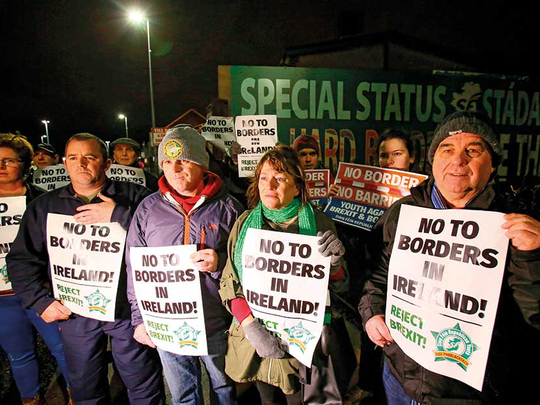
London: It is impossible to imagine a worse outcome for Britain than failing to agree a Brexit deal, the House of Lords will warn on Thursday, in a last-ditch warning to ministers under increasing pressure to walk away from stalled talks with the EU.
In a 60-page report that predicts legal and economic chaos without an exit agreement, the cross-party committee of peers cautions that a government strategy of brinkmanship with Brussels “risks becoming a self-fulfilling prophecy”.
“’No deal’ would mean the abrupt cessation of over 40 years of economic, political and legal partnership,” they conclude. “It is difficult, if not impossible, to envisage a worse outcome for the United Kingdom.”
- Lords report
The government was accused of failing to prepare for the future on Wednesday after the chancellor, Philip Hammond, revealed there had been no cabinet discussion on Britain’s ultimate relationship with Europe, and the Brexit secretary, David Davis, said no assessment of the likely impact on different business sectors had been carried out.
Theresa May is also facing a backlash from hardliners in the cabinet after it emerged that the only way to salvage a stricken first-phase agreement over Northern Ireland might be to extend EU regulatory alignment to the whole of the UK — a soft Brexit option many regard as the worst of all worlds.
Now the Lords report warns that the alternative of walking away from the talks entirely and relying on existing WTO trade rules would have catastrophic implications, ranging from a 20 per cent rise in food prices and grounded airline flights, to the loss of 75,000 jobs in the City and £8-10 billion (Dh39-Dh49 billion) in tax revenues.
“A complete ‘no-deal’ outcome would ... bring UK-EU cooperation on matters vital to the national interest, such as counter-terrorism, police, justice and security matters, nuclear safeguards, data exchange and aviation, to a sudden halt,” said the report, after taking evidence from more than 50 expert witnesses.
“It would place the status of UK nationals in the EU, and EU nationals in the UK, in jeopardy, and would necessarily lead to the imposition of controls at the Irish land border.
“The short-term impact on trade in goods would also be grave,” the peers added. “The UK’s ports would be overwhelmed by the requirement for customs and other checks. There is simply not enough time to provide the necessary capacity, IT systems, human resource and expertise to deal with such an outcome.”
The Lords warning came as business leaders also accused the Tory party of “gross irresponsibility” for considering a no-deal route out of the Brexit impasse. “To those politicians suggesting we walk away from the negotiating table, I have a simple message: careless talk will cost jobs,” the CBI president, Paul Drechsler, told an audience in the City on Wednesday night. “Businesses will press snooze for as long as they can — but the alarm will go off,” he added.
British business leaders have long warned that failure to move on from phase one talks by next week could force them to take painful contingency measures to prepare for a no-deal Brexit, but the Lords report sets out in unprecedented detail why it fears such a scenario could come about by accident.
“The key factor adding to the risk of ‘no deal’ is the lack of time,” the peers write. “While we reiterate our support for the government’s goal of securing a comprehensive agreement by October 2018, the uncertainty over the feasibility of that aim means that the overriding UK and EU interest is now to secure an orderly and legally certain transition, as early as possible.”
The committee also dismissed testimony provided by David Davis in which he claimed there could still be a “bare bones” deal with the EU if the main exit negotiations broke down. The peers argued that a disorderly break-up would be more likely to lead to a widespread breakdown in trust between the two sides.
Lord Jay, acting committee chairman and a former ambassador to France, said: “The overwhelming weight of evidence suggests that ‘no-deal’ would be the worst possible outcome for the UK, in terms of the economy, security, the environment and citizens’ rights.”
Campaigners against a hard Brexit claimed the report provided damning evidence against the theory that Britain could be prepared to walk away. “For months we have heard bluster from Brexiteers about how no deal is better than a bad deal,” said Eloise Todd, of Best For Britain. “What this report finally tells us is that no deal is a bad deal ... [it] is a brutal character assassination carried out on the whole, shambolic government.”
The government argues that it has to maintain the ‘no-deal’ option to prevent Brussels from dictating all the terms of the exit. Responding to criticism of the government’s strategy during prime minister’s questions, Theresa May claimed “very good progress” had been made in the talks.
“We’re leaving the European Union, we’re leaving the single market and the customs union but we will do what is right in the interests of the whole United Kingdom,” she said. “And nothing is agreed until everything is agreed.”
— Guardian News & Media Ltd












